#lebanese musician
Explore tagged Tumblr posts
Text
youtube


#issam hajali#poetry#music#musician#poet#Samih-Al Quasim#Ferkat Al Ard#Lebanese#lebanon#lebanese musician#resistance#70s music#70s#1970s#palestinian poet#Youtube
1 note
·
View note
Text

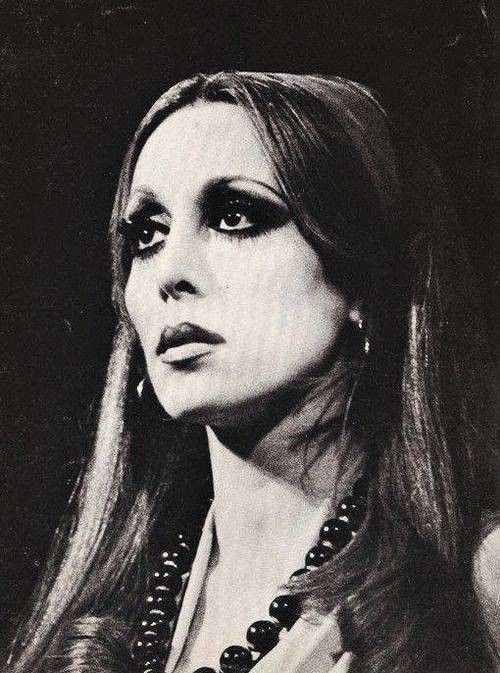
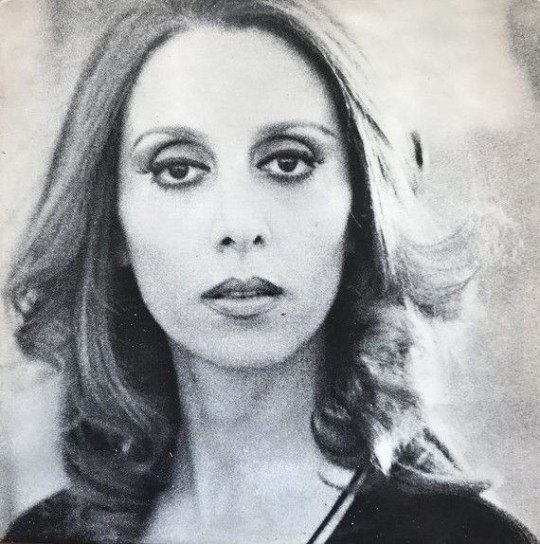


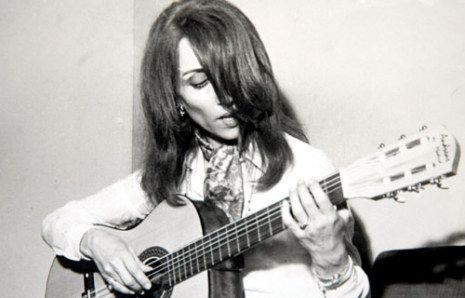
THE Fairuz 🪕
199 notes
·
View notes
Text
youtube
A Gabriel Yared medley.
#gabriel yared#film music#soundtrack#soundtracks#film score#movie music#film composer#composer#composers#orchestra#music#musician#musicians#movie#movies#film#films#france#french#lebanese#Youtube
0 notes
Text
Happy Pride Month to all my lesbians! But especially...
closeted lesbians
lesbians who hate summer
gnc lesbians
out lesbians in conservative areas/states/countries
divorced lesbians
lesbians who know how to play poker
lesbians with PCOS
butch4butch lesbians
lesbians with a name that always gives them trouble when filling out forms
detrans lesbians
brown lesbians
lesbians raised by their grandparents
lesbians with disabilities
lesbians with chronic pain
fat lesbians
touch deprived lesbians
lebanese lesbians
lesbians in recovery
lesbians who hate seafood
lesbians still in their addiction/disorders
undiscovered musician lesbians
lesbians with kids
older sister lesbians
rural living lesbians
black lesbians
lesbians with a lazy eye
40+ lesbians
intersex lesbians
lesbians who can't/won't drive
lesbians in the trades
lesbians who play softball
lesbians who hate baseball
lesbians with felonies
lesbians with active warrants against them
lesbians with no sense of direction
lesbians under 5'3
lesbians who don't know where their house/car keys are at this very moment.
lesbians who ALWAYS know where their house/car keys are, including at this very moment.
💜MUAH. HAPPY PRIDE.💜
530 notes
·
View notes
Note
for lack of a better way of putting it, do you have any suggestions under 30 for a guy who kind of just looks like a weird loser?

𝙝𝙚𝙡𝙡𝙤 𝙯𝙚𝙥. 𝙞 '𝙙 𝙡𝙞𝙠𝙚 𝙩𝙤 𝙥𝙡𝙖𝙮 𝙖 𝙜𝙖𝙢𝙚. the way this made me laugh -- ! i love this so much lol. of course, lovebug. this isn't a type of character i usually cast so i wanted to give a few more options than normal in case some of them suck. i hope you find something here that works for you 🫶🏻
Aidan Gallagher ( 2003, actor, white/Jewish )
Anwar Hadid ( 1999, model, half Palestinian )
Bo Burnham ( 1990, actor, white )
Caelan Moriarty ( 2001, musician, half Japanese )
Elliot Fletcher ( 1996, actor, white, trans )
Ewan Mitchell ( 1997, actor, white )
Finn Wolfhard ( 2002, actor, white/Jewish )
Fionn Whitehead ( 1997, actor, white )
Griffin Gluck ( 2000, actor, one quarter Japanese/Jewish )
Harris Dickinson ( 1996, actor, white )
Jackson Pace ( 1999, actor, white )
Jaeden Martell ( 2003, actor, one quarter Korean )
Kim Min Jae ( 1996, actor, Korean )
Lucas Lynggaard Tonnesen ( 2000, actor, white )
Nat Zang ( 1996, actor, white )
Patrick Gibson ( 1995, actor, white )
Tamino Amir ( 1996, musician, one quarter Egyptian && one quarter Lebanese )
Thomas Brodie-Sangster ( 1990, actor, white )
Tom Glynn-Carney ( 1995, actor, white )
Will Poulter ( 1993, actor, white )
Willem De Schryver ( 2001, actor, white )
Zhong Chenle ( 2001, musician with acting resources, Korean )


#fc help#rph#rpc#underused male fcs#underused male fc#male fcs#male fc#male faceclaim#male faceclaims#male face claim#male face claims#five nights at freddi's: mascot post#answered: fc help#vibe: loner#answered: anonymous#answered#q
70 notes
·
View notes
Text
In 1920, Syria Palestina was a Roman-named colony or region, not a country, (aka Palestine), stretching from Iraq to southern Syria, and of course, there was no country called Jordan. The word Palestine was 100% derived from the Hebrew name for the Philistines. There is no evidence of a written language left by the philistines and the only name that they were known by was the name given to them by the Hebrews at the time. The evolution of the word went something like this:
פלש—פלישתים—ארץ פלשת—סוריה פלסטינה/פלשתינה—פלסטין/פלשתין
PaLaSh—plishtim—the land of paleset—Syria Palestina (the name given to the land of Israel and Judea as a punishment by the Roman)—- Palestine
PaLaSh is the Hebrew root word for invade meaning we called the sea fairing invaders by their actual name, invaders
Important to know that the Arabs absolutely DENIED ANY RELEVANCE and would not ascribe and meaning re: "Palestine" for themselves.
Arab nationalists in the post-WWI period ADAMANTLY rejected the designation. Arab spokesmen continued to insist that the land was, like Lebanon, merely a fragment of Syria. On the grounds that it dismembered an ideal unitary Arab state, they fought before the Anglo-American Committee of Inquiry and at the United Nations. The Arab historian Philip K. Hitti informed the Anglo-American Committee of Inquiry that “there is no such thing as Palestine in history.”
In 1937, Awni Bey Abdul-Hadi, founder of the first Palestinian Arab political party, testified to the Peel Commission, "There is no such country as Palestine. 'Palestine' is a term the Zionists invented. There is no Palestine in the Bible. Palestine is alien to us."
In May 1956, Ahmed Shukairy, who became the first head of the Palestine Liberation Organization (at a time when Jordan had annexed the "West Bank" and Egypt controlled Gaza), declared to the United Nations Security Council, “It is common knowledge that Palestine is nothing but southern Syria.”
In February 1970, Prince El Hassan bin Tala of Jordan, stated to the Jordanian National Assembly that "Palestine is Jordan and Jordan is Palestine; there is one people and one land, with one history and one and the same fate." Seven months later, the PLO attempted to take over Jordan, lost, and were unceremoniously, kicked out.
In 1977, PLO Executive Committee member Zahir Muhsein stated, "The Palestinian people do not exist. The creation of a Palestinian state is only a means for our continuing struggle against the state of Israel for our Arab unity. … In reality there is no difference between Jordanians, Palestinians, Syrians, and Lebanese."
One might argue that this particular group of Arabs established, sometime in the mid 1960s, a political identity as "Palestinians," when Arafat returned from strategic partnership meetings with the Soviets communists who were attempting to gain a larger foothold in the region, and advised him how to use "Palestine" identity as a cudgel against Israel.
What they are NOT is "ancient" inhabitants of the region which, under Ottoman rule, was also dubbed "Syria-Palestine." What they are NOT is any sort of distinct ETHNIC group—like the Judeans (Judea/Samaria/Israel), the Phoenicians (Lebanon), the Kurds, the Druze, or the Circassians. They are Arabs, sharing the language, culture, religion, cuisine, ethnic group, etc. of the people of Syria, Lebanon, Jordan, Egypt, and Saudi Arabia. Prior to the 1960s, before the PLO was created, there were ZERO Arabs self-identifying as Palestinians. During the 19 years that Jordan controlled the so-called "West Bank" (Judea and Samaria, which had been cleansed of Jews by the Jordanians) and when Egypt controlled Gaza, there was no movement to create a "Palestinian" state.
Attached is a photo of the Palestine Symphony Orchestra in 1936, which consisted of 73 jewish musicians, and conducted by none other than Arturo Toscanini (born in Parma, father was a tailor). Toscanini was the music director at La Scala, before spending spent 7 years conducting the New York Metropolitan Opera (1908-1915) and the New York Philharmonic (1926-1936). He lived out his latter years in NYC, about a 1/2 mile from where I lived for a decade from 2005-2015 in Riverdale (Bronx), which is now called Wave Hill, a non-profit cultural institution and botanical garden, located on 26 acres adjacent to the Hudson River.
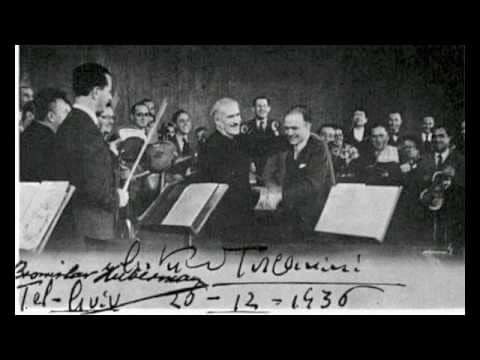
#syria palaestina#peel commission#judaism#israeli#israel#secular-jew#jewish#jerusalem#diaspora#secular jew#secularjew#islam#12 tribes of israel#samaria#judea#judean#rome#hadrian#philistines#kurds#phoenician#riverdale#bronx#toscanini#israel philharmonic symphony#palestine symphony orchestra#symphony#orchestra#syria#roman occupation
52 notes
·
View notes
Text
by Seth Mandel
There are several levels, then, of unethical behavior here. Most of the commentary has focused, understandably, on the journalistic malpractice at play. The Times even admitted publicly that the reporter, Natasha Frost, had “inappropriately shared information with the subject of a story to assist the individual in a private matter, a clear violation of our ethics.”
Others have focused on the fact that Frost had touched off a massive wave of anti-Semitic harassment that has yet to taper off. Some people went into hiding. Others had to move. One family received a picture of their five-year-old daughter with a note that said “We know where you live.” Jewish actors were kicked out of their troupe; Jewish musicians were fired; Jewish storefronts were vandalized. In total, the personal information of about 600 Jews was released into this atmosphere.
But there’s more to contemplate here. The story Frost ultimately wrote painted the group of Jews as a racialist pressure gang whose objections succeeded because the group’s target was radio host Antoinette Lattouf, a Lebanese Jew-baiter. The broadcaster who’d hired the Lattouf ended up cutting her temporary gig by a couple days after Lattouf ignored directives to avoid Jew-baiting on social media. So the targets of anti-Semitism were presented as racists for objecting to the anti-Semitism that actual racists were subjecting them to.
This is a common theme of anti-Israel propaganda. The fabricated narrative of decolonization holds that the millennia-old Jewish community from Judea is actually a century-young European project, despite the hilarious fact that the name “Palestine” is literally a European settler creation. (This is called psychological projection, and Israel’s enemies are addicted to engaging in it.) In part, this is because modern progressive ideology requires every situation to be shoehorned into a racial binary, despite the ahistorical nature of this misunderstanding of the concept of race. Progressives simply hold up a color palette to any dispute and assign places in a permanent global race war.
Another problem with the Frost saga is how a private support group for grieving Jews is remodeled in the press as the flexing of Jewish power and control. Jewish organizing is made into nefarious lobbying. Intra-communal solidarity is presented to the world as the protocols of the elders.
29 notes
·
View notes
Text
Hate to say it but the overlap of "has a fanbase that heavily values their writing abilities" and "has a fanbase that deliberately detaches/miscontrues/borderline insults/fetishizes the singer's identity and inspiration from their artistry in an effort to pretend the music is closer to what the fans think they should be" venn diagram is not only just a straight up circle, but has taken over many of the same musicians and the fandoms overlap with each other to such an extreme extent that it sometimes becomes exhausting to consume any of their music as independent artists and then discuss them, let alone seeing how a lot of these artists have a "collective" fanbase that treats them all so bizzarely. Like do y'all not see the pattern with how you always feel some need to focus on certain "nicer" aspects of musicians' identities and entirely disregard others, or be all weird about it when you do acknowledge it? I'll provide examples, hopefully you'll see what I mean.
Tamino is an Egyptian and Lebanese man, at the same time he is Belgian, and that influences his art and it's so weird to just focus just on Persephone and his more "western" songs, or compare his nose to just a bunch of western white men. Hozier is Irish and inspired by Black American musicians who make political music and it's weird when you guys pretend he's just the fairy bog boy, which tbh you also likely wouldn't be saying if he was from Pennsylvania or Manchester or whatever, you're absolutely doing it with him because he is Irish, plenty of other artists write nature themes and don't get that weirdness put on them, you're doing it because he is Irish. Ethel Cain is a Southern American and writes from that very specific experience and has religious themes that influence her music and isn't just some "backwards" "hick" "redneck" (in a derogatory, insulting sense) girl that a lot of you clearly view "people like her" down south as. Måneskin has written in English since the beginning of their career, clearly takes inspiration from English and American musicians, and isn't entitled to write in Italian just because you think they should or because their native language ~fascinates~ you as an english speaker. Mitski often writes from a very VERY obvious perspective of being an Asian American woman and yet so many of you pretend that her songs about that experience are innately applicable to all of womanhood when they clearly aren't. They just aren't. They are about her experience as an ASIAN AMERICAN woman.
There are other artists y'all do this sort of shit to too (mainly Black ones!!) and it's absolutely annoying as shit to see that you can't just appreciate their identities for what they are and still need them to be closer in proximity to you and your identity or needs to "fulfill" something for you as an outsider, to the point of being delusional about the fact that this is all first and foremost their music and that it operates with their identities and they're all fantastic writers because on various levels they're being vulnerable about their identities and selves. That's not to say you can't pull your own meaning from the songs they write or whatever, but when discussing the artists themselves a lot of you are showing your asses with how you view "people like that" and how even though you're not being weird or bigoted in an obvious, deliberately mean sort of way, a lot of you still have shit to unpack and look at before you engage with them and their stuff. I mean Jesus christ even the most surface level understanding of erasure, fetishizing, and sterotypes can show what y'all are doing subconsciously, I'd hate to see how you talk about these people's identities when it's someone you don't see as both a product yet (parasocially) a friend, but is instead someone you hate.
109 notes
·
View notes
Text

The Palmyra Hotel in Baalbek, Lebanon was damaged today in an Israeli strike and 40 people have been killed over the past day in the Beqaa Valley.
This hotel dates back to 1874 when it was established by an Orthodox Greek businessman from Constantinople due to its proximity to the ancient Baalbek ruins.
The hotel hasn’t closed its doors once since it opened 140 years ago despite political turmoil and 15 years of a long and brutal civil war in Lebanon.
Well known musicians, royals and heads of state have stayed at the hotel. Some notable guests have been legendary lebanese singers Fairouz and Sabah, as well as Nina Simone, Ella Fitzgerald, Albert Einstein and George Bernard Shaw.
On top of having no regard for civilians in Lebanon and Gaza, Israel has also been destroying our history and culture.
19 notes
·
View notes
Note

Here's the OC based on Verosika! Her names Veronica, a rising musician and livestreamer!
She's quite cute, I like that you incorporate Verosika's character while still giving it your own personal spin on it such as making Veronica famous by her being an up-incoming music artist and livestreamer than an already successful popstar. I also like that you incorporated Verosika's human design too. The frilly-like dress as well as leg crossing helps give the impression of her famous or successful background (and I also like the detail of the heart cleavage that gives a bit of a reference towards her heart tattoo, whether that was intentional or not, it's really nice to find that kind of detail) I'm curious about if she's a human or a demon that got popular in hell and what her ethnicity is if she's human given that the va for verosika is Lebanese, spanish and Tepehan (indigenious people of mexico)
#helluva boss criticism#helluva boss critique#helluva critical#helluva boss critical#helluva criticism#helluva boss rewrite#anon#ask
10 notes
·
View notes
Note
this might be a weird question but would it be weird for someone who's not palestinian to make art about/for palestine?
It's not weird AT ALL! Fairuz, the musician I sometimes talk about and who I based my URL off of, is Lebanese and she has a whole album dedicated to Palestine!
So feel free!!! Write and sing and draw and film!!! We love when we see people love our land and culture <3
51 notes
·
View notes
Text
Don't know if anyone will see or care about this but I just wanted to share with the world my deep love for the masterpiece that is the album Ahmad Al Arabi It has been a part of me since my childhood and now that I've grown up I realise just how great it is and I want to share it with the world. I don't think any other music and lyrics together make me feel like this one does. Ahmad Al Arabi is an orchestral album so it's a cohesive storyline, both when it comes to the music and to the lyrics. I recommend listening to it together since it's basically listening to a concert. Even if you do not understand a word of arabic (although there are many translations online), I believe that music like this trascends all languages and you can feel it in your soul any way. Darwish's poetry is a way to engage with Palestinian resistance through art, so I wanted to start posting about the songs on this album, sharing the words and the music. I hope that someone out there will try and listen to it, maybe discover new artists, or maybe remember childhood memories like me. I may or may not have chosen to start with this one because my name is Yasmine...
اذهب عميقا اذهب عميقا في دمي واذهب عميقا في الطحين لنصاب بالوطن البسيط وباحتمال الياسمين
محمود درويش
Go deep into my blood, Go deep into the bread, So that we will have A simple homeland And a dream of jasmine yet to come...
youtube
A poet by Palestinian poet, Mahmood Darwish (1941-2008)
Translation by Umfalastin
Music by Lebanese musician, oud player and composer Marcel Khalife
#marcel khalife#mahmoud darwish#mahmood darwich poetry#ahmad al arabi#mahmood darwish#palestine music#palestinian music#´#palestinian art#stand with palestine#arabic#arab#arab music#arab poetry#music#orchestral music#falasteen#falastin#go deep#Youtube#arabic poetry#arabic poems#arabic art#palestinian poetry#palestinian literature#poetry#poetic
10 notes
·
View notes
Text

EGBERTO GISMONTI Toronto 1990
Egberto Gismonti was born in Carmo, a small north of Rio de Janeiro, in 1947 to Sicilian and Lebanese parents. He taught himself to play guitar after studying music in Paris with Nadia Boulanger, designing guitars with more than six strings to expand the range of the instrument and create the sound of more than one musician playing. He made his first record for the Elenco, the legendary Brazilian record label, in 1969, but it’s his work with the German label ECM that’s made his name around the world, starting with a recording with Nana Vasconcelos, Dança das Cabeças, in 1977.

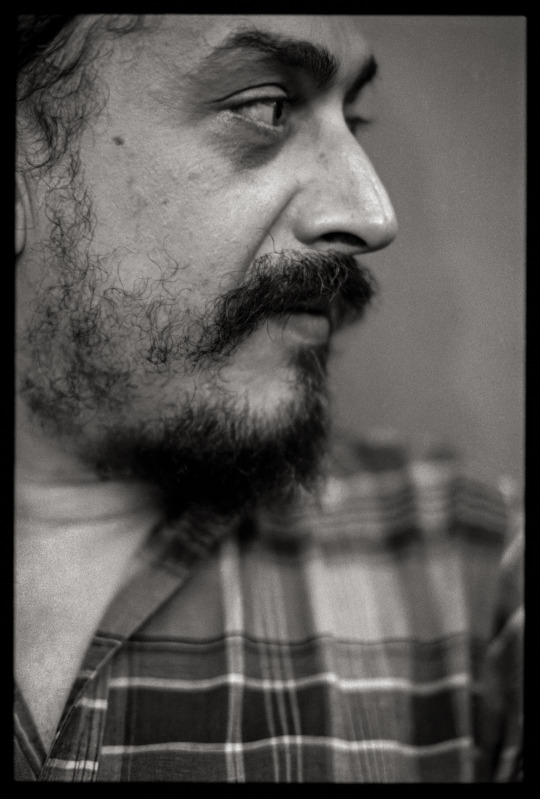


I photographed Egberto Gismonti when he came to Toronto and shared a bill with fellow Brazilian Hermeto Pascoal. He was promoting either Dança dos Escravos or Presents a Musical Childhood with Infância – probably the former, a solo guitar record on ECM. The concert would have been a study in contrasts – Pascoal’s raucous big band using everything at hand versus Gismonti’s comparatively austere guitar playing. I honestly wish I’d taken pics of the concert, but I was already getting tired of concert photography and, to be honest, more interested in actually seeing shows than documenting them.




My memory is that I did my portraits of Egberto Gismonti either in his own dressing room or away from the chaos of Hermeto Pascoal and his band backstage at the midtown club where they were sharing a double bill. I was working light, with just my Nikon F3 and some fast Kodak black and white film. In situations like this I would default to the first photographic style I studied – the work of photographers in the British music weeklies in the ‘80s – and I think it shows. I was shooting with my lens wide open, and probably no more than a couple of feet with my subject – a working method I’ll still use today when I need to (forcibly) create a sense of intimacy in a shoot.

#portrait#portrait photography#photography#black and white#some old pictures i took#early work#film photography#egberto gismonti#brazilian music#jazz#guitarist#nikon f3
2 notes
·
View notes
Text
youtube
A bit from Gabriel Yared's soundtrack for "Message in a Bottle".
Yared played the piano himself for the recording.
#gabriel yared#message in a bottle#kevin costner#robin wright#paul newman#luis mandoki#film music#soundtrack#soundtracks#film score#movie music#film composer#composer#composers#orchestra#music#musician#musicians#movie#movies#film#films#france#french#piano#lebanese#Youtube
0 notes
Note
I have a question about music! I want to get more into Arabic music (women specifically) but the only Arabic musician I know of right now is Faouzia, who is AMAZING, however she doesn’t have a lot of music in Arabic. She uses cultural inspiration in her music (she’s Moroccan), but only has a couple songs with one Arabic word in it (Habibi & Puppet). I like listening to music in other languages and was hoping maybe you had recommendations for Arabic female musicians
never heard of faouzia! thanks for informing me of her. and yes im gonna first name some famous arabic pop singers and then ill move onto some that i also like:
nancy ajram
this woman is probably one of the biggest popstars in the arab world and has been for decades. she has a lot of great hits and id honestly just recommend going thru her music esp her older stuff bc you might like something in there. shes a lebanese christian
youtube
2. haifa wehbe
not a fan of hers but she has some hits and shes also one of the most renowned popstars.
youtube
3. myriam fares
also one of the bigger popstars, she also tends to play with a lot of arabic genres. shes mostly known for her dancing i think, shes quite talented but im not big on her music (im just sharing my faves btw so this is one of my faves and its clearly awful quality)
youtube
4. ruby
i looooooove ruby she was basically the only dark-skinned woman i saw in mainstream arab media and shes an awful dancer but makes amazing music and is also an actress (and ive heard shes quite good at that too) and is a good singer. also afaik shes one of the few female artists that didnt get plastic surgeries (if she did its so mild that its not noticeable). shes egyptian (previous singers i shared are all lebanese)
youtube
5. shadia mansour
one of the only female rappers i know of, i dont know much of her music but this song is really good and the lyrics are amazing. shes palestinian & british and this song is about palestinian resistance basically
youtube
6. elyanna
this one is more modern than my other recommendations fhsdfhds but shes quite good, iirc shes half palestinian half..chilean? i think?
youtube
7. samira said
shes north african, i Think tunisian, and one of the bigger popstars from the 2000s. i dont really listen to most of her music but this one's a classic:
youtube
8. fairuz
this one's quite old-fashioned but definitely a classic and her music continues to be played a lot today... especially by lebanese people. shes a lebanese singer who i think was really prominent for decades starting from the 50s. not sure how her music will be perceived by someone who didn't grow up hearing it tho. shes also lebanese christian
youtube
9. luka salam
only know one song of hers but its a nice one, the lyrics are great and i was obsessed with it at one point. i know shes got others. idk where shes from tbh
youtube
10. maryam saleh
i only know one song of hers too but its also a nice one. shes egyptian
youtube
adding more in reblogs bc i ran out of links to add lol
27 notes
·
View notes
Note
do you have any alts for lea michele? not necessarily rachel berry

𝙝𝙚𝙡𝙡𝙤 𝙯𝙚𝙥. 𝙞 '𝙙 𝙡𝙞𝙠𝙚 𝙩𝙤 𝙥𝙡𝙖𝙮 𝙖 𝙜𝙖𝙢𝙚. ooh, definitely!! the height of lea's fame was obviously in glee where she was in her 20s, so i gave some younger suggestions as well. these are all based on vibes and facial similarity more than anything else! like if i would consider both actresses for the same role.
Anya Chalotra ( 1995, actress, half Indian )
Camila Morrone ( 1997, model with acting resources, white/Jewish )
Conor Leslie ( 1991, actress, white/Jewish )
Diana Silvers ( 1997, actress, white/Jewish )
Gigi Zumbado ( 1996, actress, Cuban )
Greta Onieogou ( 1991, actress, half Black )
Kaia Gerber ( 2001, model with acting resources, white/Jewish )
Katie Parker ( 1986, actress, white )
Kira Kosarin ( 1997, actress, white/Jewish )
Laura Kariuki ( 1998, actress, Black )
Meaghan Rath ( 1986, actress, half Indian && half white/Jewish )
Olivia Rodrigo ( 2003, musician with acting resources, half Filipino )
Rachel Matthews ( 1993, actress, white/Jewish )
Rachel Zegler ( 2001, actress, half Colombian )
Simay Barlas ( 1999, actress, Turkish )
Stella Maeve ( 1989, actress, parts Blackfoot-Cherokee && white/Jewish )
Sude Zulal Guler ( 2001, actress, Turkish )
Yasmeen Fletcher ( 2003, actress, half Lebanese )
Yvette Monreal ( 1992, actress, half Chilean && half Mexican )


#glee rph#glee rpc#lea michele fc#alt fc#alternative fc#alternate fc#fandom rph#jewish fc#replacement fc#fandom rpc#fc replacement#glee fandom#glee rp#glee redo rp#five nights at freddi's: mascot post#answered: fc help#answered: anonymous#answered#answered: alt fc#answered: dreamcast
10 notes
·
View notes